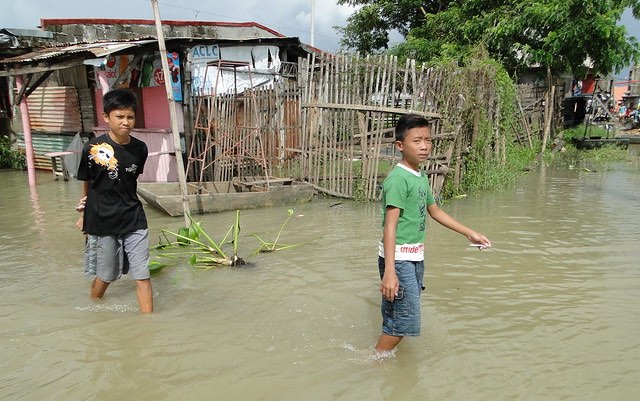Today, the global food system finds itself facing major challenges. Mainly, they relate to changing diets, climate change, persistent conflicts and crises, and anti-globalization sentiments, with implications at national, regional, and global levels.
Rapid urbanization and middle-class growth—resulting in changing diets—have been increasing pressure on food systems. At the same time, the growing impacts of climate change also threaten the agriculture industry, affecting productivity, prices, and food security.
The percentage of Asian countries experiencing multiple climate shocks more than doubled to 51% in 2011-2016, compared to 23% in 1996-2000.
In this context, multiple burdens of malnutrition also persist. In Asia, more than 83 million children under the age of five experience stunted growth, while over 17 million are overweight. In the Pacific, the percentage of overweight children under five rose to around 9% in 2017 from around 5% in 2000. The percentage of overweight and obese adults are rising at a greater rate in Asia, with that of overweight females reaching 30% in 2016 and 29% among males.
Further, these problems are also interrelated, creating complex challenges for food security and nutrition—often disproportionately so for vulnerable groups.
For instance, climate change and related extreme climate events are key drivers behind the recent rises in global hunger and one of the leading causes of severe food crises. This causes migration—both seasonal and permanent—among communities that are forced to find more sustainable sources of food.
In times of conflict, the rural poor, especially smallholder farmers, women, and youth, tend to suffer the most from disruption of basic services, destruction of infrastructure, and loss of market access.
Prolonged or recurrent climate extremes lead to diminished coping capacity and loss of livelihoods amongst these groups, which contribute to voluntary and involuntary migration for safety, food security, and opportunities to improve livelihoods.
Food insecurity can also play a key role in sparking political conflicts. Amid intensifying climate change effects, this can further compound crises, altogether pushing even more people out of their homes.
In 2017, floods and other climate shocks placed more than 21 million people in crisis and more than 10 million in emergency situations in Afghanistan, Nepal, Pakistan, Bangladesh, Sri Lanka, and Yemen—many of which also suffer from conflict and political upheaval.
To ensure resilience and food security, it will be key to transform agri-food systems for both human and planetary health through innovative policies, technologies, and institutions.
First, countries must reconsider their investment priorities and reform their subsidy policies to promote sustainable production and to enhance the availability and affordability of healthy, nutritious foods. This is especially important in the face of challenges arising from climate change and conflicts.
Globally, dark leafy greens are more than 10 times as expensive as staple cereals when compared in terms of price per calorie. Diverting funds can help produce healthy foods to improve access and affordability for vulnerable groups, as well as providing income for them.
Funds can also be used to increase longer-term investment in R&D relating to more nutritious foods like fruits, vegetables, beans, dairy, and fish. Combining transfer programs with behavior-changing communication has also shown promising improvements in nutrition, and may further aid with promoting sustainable diets.
Second, multiple-win technologies provide opportunities to enhance food security and nutrition in a sustainable manner. Investing in promising technologies—such as improved, climate-resilient crop varieties—can enhance the disease- and climate-resilience of food supplies, while crop-sensing technologies for efficient fertilizer usage can lessen the overall negative environmental impacts of food production.
Supporting low-cost technologies, especially in cooling and storage, will be key to reducing food loss and waste.
Information and communications technologies, especially big data analytics, have the potential to transform food systems by lowering transaction costs and improving monitoring along the value chain. Moreover, they can help improve basic services before and during crises. It will also be important to support nutrition-driven and nutrition-sensitive technologies such as biofortification.
Third, we need to promote strong and inclusive institutions that can support food security and nutrition. Enhancing institutional capacity on nutrition will also be necessary for universities, government agencies, and extension services. This is especially important in helping address nutrition-related information asymmetries and facilitating access to necessary assets for households—including during times of crisis from climate change and conflict.
Strengthening institutions can help close gender gaps, but this will require institutional reforms and enhanced governance to ensure women’s empowerment. Utilizing tools such as the Women’s Empowerment in Agriculture Index may be helpful.
Promoting effective governance mechanisms will also be key, such as coordinating across government sectors on nutrition and supporting partnerships and financial arrangements for climate-smart initiatives. This will be especially important with the increased movement of people not only across borders, but also within them.
To ensure lasting solutions for human and planetary health under climate change and conflict—in the Asia-Pacific region and beyond—programs and policies must address root causes. They must also provide people with the means to rebuild livelihoods through restoring agriculture and food production before, during, and after conflict and crises.
Shenggen Fan is Director General of IFPRI. This post first appeared on the Asia and the Pacific Society Policy Forum.







